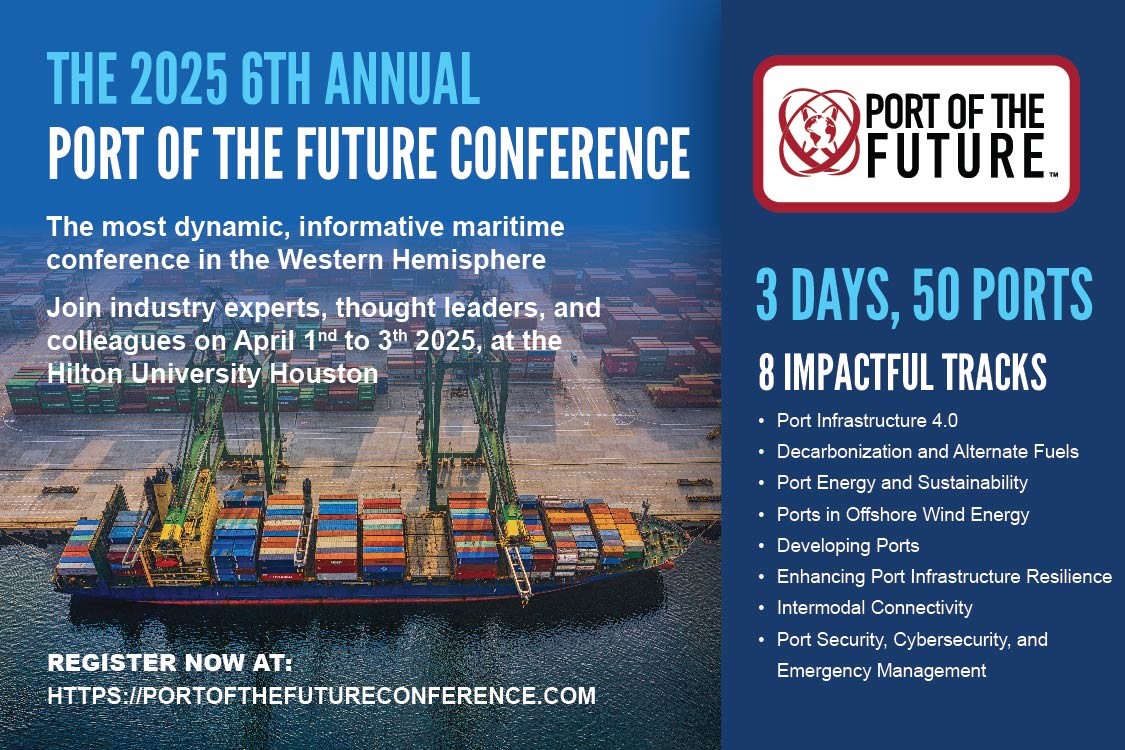2025 Port of the Future Conference: 3 Days, 50 Ports
 This spring, the University of Houston will host its 6th Annual Port of the Future Conference on April 1-3 at the Hilton University Houston on the university campus. Since its inception in 2020, Port of the Future has garnered notice throughout the maritime sector as a dynamic, highly informative, content-packed event, and has become one of the largest port conferences in the western hemisphere.
This spring, the University of Houston will host its 6th Annual Port of the Future Conference on April 1-3 at the Hilton University Houston on the university campus. Since its inception in 2020, Port of the Future has garnered notice throughout the maritime sector as a dynamic, highly informative, content-packed event, and has become one of the largest port conferences in the western hemisphere.
“Our vision is to create a maritime conference shaped by new concepts, promising research, best practices, and cutting-edge technology,” stated Kevin Clement, conference director, at the Borders, Trade, and Immigration Institute at the University of Houston. “Our focus is to highlight pressing issues while providing the latest advances in technology and processes to help revitalize our nation’s ports. We strive to spotlight and promote new concepts and technologies relevant to our ports and the maritime sector.”
The Port of the Future Conference has become an international symposium. The conference has confirmed speakers and port representatives from Azerbaijan, Belgium, Canada, Denmark, the Netherlands, Nigeria, Colombia, Peru, Morocco, and the Bahamas - with more anticipated.
Liiving up to its tagline, “3 Days, 50 Ports”, more than 50 ports have already confirmed they will attend. Organizers anticipate that number will climb to over 70 participating ports.
This year’s list of guest speakers is stellar. Admiral Linda Fagan, Commandant, U.S. Coast Guard, will provide the keynote address. Other plenary speakers include Jen Easterly, past director of the Cybersecurity and Infrastructure Security Agency; Stephen Metruck, executive director of the Port of Seattle; Carl W. Bentzel, past commissioner, Federal Maritime Commission; and Charlie Jenkins, executive director, Port Houston. Prominent international speakers are led by Juan Carlos Paz, president of the National Port Authority, Peru; Dina Rafaela Sierra, delegate superintendent of Ports and Superintendence of Transport for Colombia; Bola Oyemamiji, managing director and CEO of National Inland Waterways Authority for the Federal Republic of Nigeria, and Gurban Karimbayli, ESG advisor, Port of Baku, Azerbaijan.
The conference’s coverage of issues and advances relative to ports and the maritime industry is impressive. Organized in eight tracks, the conference covers the areas of: developing ports; intermodal connectivity; enhancing port infrastructure resilience; decarbonization and alternate fuels; port energy and sustainability; port infrastructure 4.0 (consisting of advances in artificial intelligence; automation, robotics, and digitalization and information sharing); ports in offshore wind energy; and port security, cybersecurity and emergency management.
The Port of the Future Conference is structured to address current and emerging issues. Carl Bentzel, formerly of the Federal Maritime Commission, will introduce the Maritime Transportation Data System, a new standard of information sharing in U.S. ports. Representatives from Peru will describe the development of Port Chancay by China and the impact of a growing Chinese presence in South America. David Walker, vice president of the American Bureau of Shipping will outline the creation of MARAD’s new U.S. Center for Maritime Innovation.
The rising threat of cyberattacks on ports is a central theme. Jen Easterly will provide perspectives on the “Cyber and Infrastructure Security of U.S. Ports.” Among other topics, Stephen Metruck is expected to discuss the Port of Seattle’s response to its recent ransomware attack. The Port of Los Angeles and IBM will present information on the creation and operation of its Port Cyber Resilience Center.
Special topics are showcased throughout the conference using case studies. One such case study focuses on “Port Disaster Insurance and Underwriting.” In 2024, the port of Tampa Bay, fell victim to two hurricanes (Helene and Milton) within 13 days, In December, Peru’s coastline was slammed by massive waves, closing down 91 of its 120 ports. As hurricanes, flooding, and storm damage are becoming more common, ports and terminals suffer greater risk – and the threat of becoming overcharged and underinsured.
Efforts to accelerate the transition of ports and waterborne transportation to net-zero GHG emissions are highlighted in tracks on “Decarbonization and Alternative Fuels” and “Port Energy and Sustainability”. Michael Beruba, the U.S. Department of Energy’s deputy assistant secretary for Sustainable Transportation and Fuels will speak on new fuels and technologies. Panels will cover such topics as biofuels in the maritime sector, compare the future viability of electric drayage versus hydrogen-powered vehicles; and assess the introduction of electric ferry systems in U.S. ports.
A presentation by Tidal Sails AS showcases ground-breaking technology to extract kinetic energy from slow moving water, generating low-cost electricity for ports.
This year, the conference allows interested persons to sign up for a one-day, reduced-rate track on “Port Security, Cybersecurity and Emergency Management.” In addition to cybersecurity topics, its speakers will offer presentations on next-generation port radiation monitors, the use of AI in incident command, InfraGard, expanded use of facial biometrics, and port surveillance systems with intelligence acoustic interpretation.
The Port of the Future Conference remains true to its roots in higher education. The conference again hosts its annual Student Research Poster Contest, promoting research in the maritime sector by undergraduate students. Other activities will include a networking reception with country music recording artists Bill Mock and Karl Waitz, a port grants workshop, and a boat tour of Port Houston.
